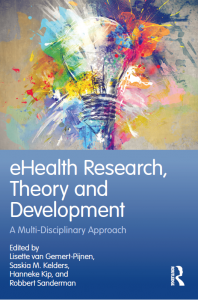The research and tuition conducted by Lisette van Gemert focuses on the design, implementation and evaluation of technology in the healthcare sector with the aim of improving the overall quality of health and safety. The research in particular is oriented towards human-centered and value-driven technology and includes three subthemes: user centered development, persuasive technology design, and business modelling (implementation).
Research is part of the Persuasive Health Technology lab, Research center of the Center for eHealth &Wellbeing Research at the University of Twente.
The work is carried out in close collaboration with the University of Canada, Oulu and UMCG
University of Oulu Finland (Prof dr H. Oinas Kukkonen), the University of Waterloo in Canada (adjunct Professor Van Gemert-Pijnen), UMCG (The Netherlands). Students can conduct research at these universities.
Positions
- Prof dr. Persuasive Health Technology
- Head of the Centre for eHealth & Wellbeing Research
- Adjunct Professor, University of Waterloo
- Senior Researcher UMCG (Medical Microbiology dept; Health Science dept)
For more details about the Lab Persuasive Health Technology (in 90 sec) at the Center for eHealth go to: http://www.cewr.nl and for additional information about products, projects http://www.utwente.nl/igs/ehealth/research/persuasive-health-technology/ and positions and publications or reports, click here.
For more info about Lisette van Gemert on the 'Featured Scientists' page, click below:

Expertise
Medicine and Dentistry
- e-Health
- Patient
Psychology
- Health
- Research
- Healthcare
- Behavior
- Evaluation
Nursing and Health Professions
- Telehealth
Organisations
Publications
2025
2024
Research profiles
- Bachelor, Masters eHealth Psychology, Health&Technology
- eHealth and Quality of Care (Health Science, MB)
- Bach/Master Thesis eHealth (international)
Students interested in research relating to one of the three subthemes are advised to contact Dr. J. Van Gemert-Pijnen directly. MSc/BSc assignments are especially welcome when focused on persuasive technology (experimental research into the effects of persuasive communication); co-creation - that is to say participatory development through usability methods and social media (online communities, twitter, weblogs, etc) and business modelling; the process for creating human-centered and value-driven technology.
Current research projects
WELCOME TO THE PERSUASIVE HEALTH TECHNOLOGY LAB!
For an overview see, http://www.utwente.nl/igs/ehealth/research/persuasive-health-technology/
The lab persuasive health technology (Center eHealth Research & Wellbeing) focuses on personalized healthcare supported by technology. We apply a holistic approach to develop successful and engaging eHealth technologies and we study the effects and impact of these technologies on society, communities, and individuals. In this, we take into account the “whole human being” in the context of living and working. Our research is interdisciplinary based, rooted in persuasive psychology, engineering, and implementation science. We study and build on the interplay of technology, human life, and society.
Research that is currently underway focuses on technological innovations in healthcare. The premise is that technology must make a qualitative and cost-effective contribution to health and safety. This means that during the research (and through the courses) we set out to address the following question: Which forms of technology are acceptable, appropriate, enjoyable, and affordable for stakeholders and end-user groups in order to support specific elements of a work process or healthcare process? The research focuses on developing generic knowledge whereby we examine specific technological applications in the form of case studies. Throughout the research special attention is paid to methods for participation of stakeholders in the development and implementation process.
We also examine the type of quality criteria demanded by the end-users of the eHealth technologies and identify which of these demands plays a role in whether or not the technologies are eventually accepted. During implementation, we examine how goals are actually achieved in practice.
Finished projects
eHealth Research, Theory and DevelopmentA Multi-Disciplinary ApproachEdited by Lisette van Gemert-Pijnen, Saskia M. Kelders, Hanneke Kip & Robbert Sanderman
This is the first book to provide a comprehensive overview of the social and technological context from which eHealth applications have arisen, the psychological principles on which they are based, and the key development and evaluation issues relevant to their successful intervention.
Integrating how eHealth applications can be used for both mental and physical health issues, it presents a complete guide to what eHealth means in theory, as well as how it can be used in practice. Inspired by the principles and structure of the CeHRes Roadmap, a multidisciplinary framework that combines and uses aspects from approaches such as human-centred design, persuasive technology and business modelling, the book first examines the theoretical foundations of eHealth and then assesses its practical application and assessment.
Including case studies, a glossary of key terms, and end of chapter summaries, this ground-breaking book provides a holistic overview of one of the most important recent developments in healthcare. It will be essential reading for students, researchers and professionals across the fields of health psychology, public health and design technology.
Books are available via the publisher. Do you consider the book for course adoption? Digital inspection copies are available upon request.


De UT tekende maandag een ‘Memorandum of Understanding’ (MoU) met de universiteit van Waterloo (Canada). Wat houdt zo’n afspraak in en wat hebben we eraan als universiteit?
Voor hoogleraar persuasieve gezondheidstechnologie Lisette van Gemert begon de samenwerking met de universiteit van Waterloo al acht jaar geleden. Zij heeft ook een benoeming bij deze universiteit.
Uitwisseling
Deze MoU is getekend als verdere stap naar duurzame samenwerking, zegt Van Gemert. ‘Vijf jaar geleden is een samenwerking opgezet, waarbij de ondertekening maandag de samenwerking bestendigt en voortzet.’ Inmiddels is een trans-Atlantische grant vanuit Canada en UT geïnitieerd, waarbij ook de universiteit Oulu uit Finland betrokken is.
‘De samenwerking is gericht op de toepassing van persuasieve technologie in de gezondheidszorg’, vervolgt Van Gemert. ‘We richten ons ook op uitwisseling van onderwijs en onderzoek.’ Zo zijn UT-studenten en –PhD’s naar Waterloo geweest voor onderzoek en zullen deze zomer studenten uit Canada gratis deelnemen aan UT-zomerschool CuriousU.
Workshops
Deze week staat in het teken van workshops die worden gegeven op de UT, zegt Van Gemert. Onderzoekers van BMS, EWI en CTIT en de Canadese en Finse universiteit werken hier concreet aan een onderzoeksvoorstel, om subsidie uit internationale programma’s te verwerven, zoals het Horizon 2020-programma.
‘We willen onze samenwerking verbreden én verdiepen, op het gebied van toepassingen in de gezondheidszorg’, vertelt Van Gemert. ‘Het doel is daarom om fondsen te werven voor onderzoeksprojecten gericht op data-gestimuleerde zorgverlening.’
Volgens haar kunnen de drie universiteiten elkaar namelijk versterken vanuit hun eigen disciplines. ‘Waterloo is heel sterk in human factor design, terwijl Oulu meer gespecialiseerd is in persuasive design. Wij zijn als UT juist weer heel sterk in de verbinding tussen de sociale en technische wetenschappen.’
Zinloze betekenis?
Van Gemert: ‘Alle ingrediënten om aan de slag te gaan met data-gestimuleerde zorgverlening zijn aanwezig. Deze MoU is een onderlegger om vanuit een bepaalde filosofie aan de slag te gaan. Dit is een heel mooie transactie.’
Want, zo erkent Van Gemert, niet zelden heeft zo’n MoU als ondertekend papieren document een zinloze betekenis. ‘Maar dat is hier niet het geval. Deze overeenkomst heeft echt body; met een voorgeschiedenis en een toekomst.’
http://https://www.utoday.nl/tag/Lisette%20van%20Gemert

Het Center for eHealth & Wellbeing research van de UT is een belangrijke schakel in het grootschalige Benefitproject, dat onlangs de kick-off beleefde. Doel van het project: Nederland gezonder maken, zónder daarvoor het opgestoken vingertje te gebruiken.
Het draait in het Benefitproject allemaal om het belonen van gezond gedrag. In eerste instantie richt het nieuwe gezondheidsprogramma zich op mensen met (aanleg voor) hart- en vaatziekten. Zij kunnen Benefitpunten sparen door online leefstijlcursussen te volgen of mee te doen aan challenges, zoals lessen volgen bij de sportschool of deelnemen aan de avondvierdaagse. De opgespaarde punten zijn in te wisselen voor leuke uitstapjes of voor producten bij grote winkelketens. Het is de bedoeling dat het project later ook wordt uitgerold voor andere doelgroepen, zoals mensen met een depressie of nierziekten.
Engineering health
Als hoofdaannemer van het Benefitproject kreeg de Universiteit Leiden recent 2,5 miljoen euro subsidie van ZonMw en de Hartstichting. Dat geld wordt verdeeld onder de partners. De UT heeft met behulp van de zogenoemde CeHRes roadmap het ontwerp gemaakt voor het Benefitproject, in samenspraak met de doelgroep en met stakeholders. Lisette Van Gemert, hoogleraar Persuasive Health Technology, noemt de ‘engineering health aanpak’ kenmerkend voor de UT. ‘Technologische innovaties met een businessmodel dat gedragsveranderingen bevordert, UT-studenten krijgen dat in onderwijs en onderzoek ingebed. Wij hebben al meerdere Persuasive technologieprojecten afgerond en zijn de enige universiteit met een leerstoel Persuasive Health Technology. Dat geeft het Benefitproject een echt UT-geurtje.’
Gezondheidsportaal
De UT richt zich voor het Benefitproject verder op de monitoring van een nieuw gezondheidsportaal, waarop de persoonlijke data van deelnemers wordt bijgehouden. Het portaal toont gegevens over hun activiteitenmeter, bloeddrukmeter, weegschaal en apps op de mobile telefoon. De UT analyseert het gebruik. ‘Maar dat niet alleen’, zegt Van Gemert, ‘we volgen het programma op de voet. We verzamelen logdata, vragen gebruikers naar hun bevindingen, houden bij wat, wanneer en hoe vaak ze iets aanklikken en analyseren de geschiedenis van hun gebruik. Dit project is een blauwdruk voor de toekomst. Partners als zorgprofessionals, kennisinstellingen en CEO’s van bedrijven die producten of diensten leveren kunnen en moéten elkaar weten te vinden. Als het Benefitproject slaagt, dan is dat dus een heel mooie stap.’
De kick-off voor het Benefitproject is geweest. In september wordt het project verder uitgerold.
UT-hoogleraar persuasieve gezondheidstechnologie Lisette van Gemert-Pijnen krijgt een miljoen euro subsidie. Het geld is bedoeld om onderzoek te doen naar infectieziekten in de Euregio.
Van Gemert zal zich samen met twee promovendi en een postdoc richten op zogeheten bijzonder resistente micro-organismen (BRMO’s), oftewel bacteriën die resistent zijn geworden tegen antibiotica.
Aandachtsgebied
In het bijzonder ligt de focus op zoönosen in het Euregiogebied: ziektes die van dier op mens en vice versa overgebracht kunnen worden. Van Gemert legt uit: ‘Zoönosen zijn de snelst opkomende ziektes. Je kunt de Euregio een aandachtsgebied noemen. In de grensregio van Groningen tot Nijmegen is het risico op dergelijke infecties hoog. Er is veel intensieve veeteelt en er wonen relatief veel ouderen en mensen met chronische aandoeningen.’
Van Gemert vervolgt: ‘Als UT zijn we de enige partij in een samenwerkingsverband van zo’n vijftig partners die inzet op het ontwerpen van technologie, in het bijzonder persuasieve gezondheidstechnologie. Oftewel, hoe krijg je mensen gemotiveerd om bewuster om te gaan met antibiotica en hoe kun je ze in hun besluitvorming ondersteunen.’
eHealth
Zo gaan de onderzoekers onder andere aan de slag met het ontwikkelen van een ‘serious game’ voor zorgprofessionals en wordt gekeken naar het onderzoeksgebied geohealth. ‘Dat is misschien voor de UT wel de grootste winst’, zegt Van Gemert.
‘Met de kennis uit drie faculteiten – BMS, EWI en ITC – willen we voorspellende modellen ontwikkelen. Bijvoorbeeld door gegevens uit ziekenhuizen, laboratoria en de mobiliteitsdata van mensen en dieren te combineren, om daarmee risicogebieden en –groepen te kunnen identificeren. Op die manier zou je bijvoorbeeld iemand die werkzaam is in de veeteelt heel gericht kunnen voorlichten om niet een ouder persoon in het ziekenhuis te bezoeken.’
In the press

News on utwente.nl
https://www.utwente.nl/en/news/!/2018/6/165243/3-novel-high-tech-human-touch-projects-from-pervasive-system-group-and-persuasive-health-technology-lab-bms
Address

University of Twente
Cubicus (building no. 41), room B125
De Zul 10
7522 NJ Enschede
Netherlands
University of Twente
Cubicus B125
P.O. Box 217
7500 AE Enschede
Netherlands
Organisations
Additional contact information
Cubicus B 125
Drienerlolaan 5
7522 NB Enschede